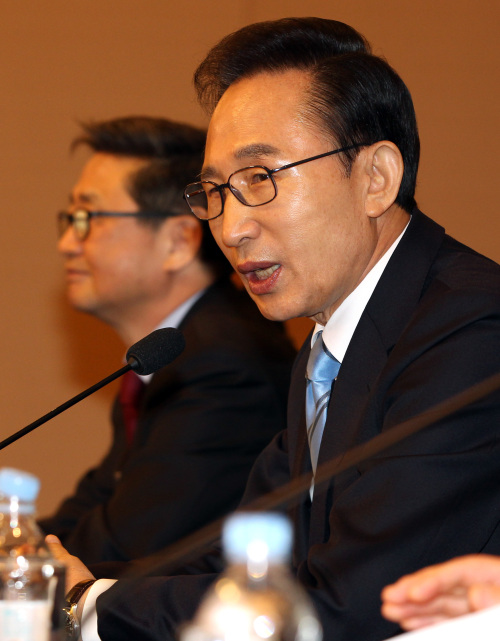Ieodo not part of territorial dispute with China: Lee
By Korea HeraldPublished : March 12, 2012 - 21:03
President Lee Myung-bak stressed Monday that Ieodo, a submerged rock south of Jeju Island, is within South Korea’s jurisdiction, dismissing China’s renewed claim to the economically important maritime area.
But he said that the continuing arguments between Seoul and Beijing over the rock were not a “territorial dispute,” in an apparent show of concern that the issue could undermine bilateral ties as the two mark the 20th anniversary of their diplomatic relations.
“How we manage the waters near Jeju is closely related to South Korea’s economy. Thus (we) cannot help but respond sensitively to this issue,” Lee said during a meeting with the managing editors of major newspapers and broadcasting companies, which was hosted by the Korea News Editors’ Association.
But he said that the continuing arguments between Seoul and Beijing over the rock were not a “territorial dispute,” in an apparent show of concern that the issue could undermine bilateral ties as the two mark the 20th anniversary of their diplomatic relations.
“How we manage the waters near Jeju is closely related to South Korea’s economy. Thus (we) cannot help but respond sensitively to this issue,” Lee said during a meeting with the managing editors of major newspapers and broadcasting companies, which was hosted by the Korea News Editors’ Association.

“I want to say that whatever form it may take, Ieodo comes within South Korea’s jurisdiction.”
Noting that the rock is 4.6 meters below sea level, Lee said it cannot be called territory. But in future negotiations with China over the maritime jurisdiction, he said Seoul would be at an advantage given Ieodo’s proximity to South Korea’s coastline.
The rock in question is in the overlapping EEZ of the two countries. But South Korea says it is within its EEZ, given that it is located 149 kilometers southwest of Korea’s southernmost island of Marado, while China’s nearest island of Yushandao is 287 kilometers away.
Local media reported last weekend that Liu Cigui, the director of China’s State Oceanic Administration, recently said that his administration had established a system to patrol and enforce domestic law over areas of China’s jurisdiction “including Ieodo.”
The issue over Ieodo erupted as Seoul and Beijing grappled over the repatriation of North Korean defectors.
During the meeting, Lee reiterated that the issue of the defectors is a humanitarian one and concerns universal values of humanity.
Touching on the arguments that Seoul should “restore” inter-Korean relations, Lee said that Seoul should establish a new relationship with the North, and in that regard, his administration has made some headway.
Critics have argued that Lee’s tougher stance than former liberal governments is one reason for worsened relations between the Koreas.
“For noticeable outcomes in the relations, we can give things and have reunions of separated families. But (what happened was), for example, the North made nuclear (weapons), missiles and launched provocations in the West Sea,” he said.
“I think in principle we should establish a new relationship with the North.”
Lee also dispelled growing concerns that South Korea is being sidelined by the North while Pyongyang continues to hold talks with Washington over its nuclear disarmament.
During recent talks between the two wartime foes, Pyongyang agreed to temporarily stop its uranium enrichment at its main nuclear complex in Yongbyon and put a moratorium on nuclear and missile tests in exchange for “nutritional assistance.”
“In terms of North Korea issues, South Korea and the U.S. have tightly coordinated and cooperated, more than you can imagine. The North has also learned that its relations with the U.S. cannot transcend South Korea-U.S. ties,” he said.
Regarding the possibility of inter-Korean summit talks, Lee reiterated that he would not engage in a summit for any political purposes.
“In fact, there have been one or two opportunities for the summit. But there is no meaning in customarily holding talks with strings attached as we did in the past,” Lee said.
By Song Sang-ho (sshluck@heraldcorp.com)
-
Articles by Korea Herald







![[Graphic News] More Koreans say they plan long-distance trips this year](http://res.heraldm.com/phpwas/restmb_idxmake.php?idx=644&simg=/content/image/2024/04/17/20240417050828_0.gif&u=)
![[KH Explains] Hyundai's full hybrid edge to pay off amid slow transition to pure EVs](http://res.heraldm.com/phpwas/restmb_idxmake.php?idx=644&simg=/content/image/2024/04/18/20240418050645_0.jpg&u=20240419100350)






![[From the Scene] Monks, Buddhists hail return of remains of Buddhas](http://res.heraldm.com/phpwas/restmb_idxmake.php?idx=652&simg=/content/image/2024/04/19/20240419050617_0.jpg&u=20240419175937)

![[KH Explains] Hyundai's full hybrid edge to pay off amid slow transition to pure EVs](http://res.heraldm.com/phpwas/restmb_idxmake.php?idx=652&simg=/content/image/2024/04/18/20240418050645_0.jpg&u=20240419100350)

![[Today’s K-pop] Illit drops debut single remix](http://res.heraldm.com/phpwas/restmb_idxmake.php?idx=642&simg=/content/image/2024/04/19/20240419050612_0.jpg&u=)